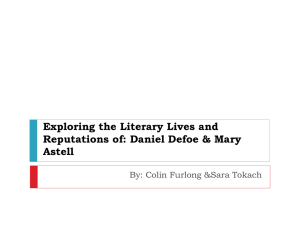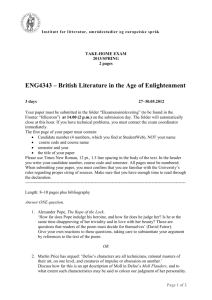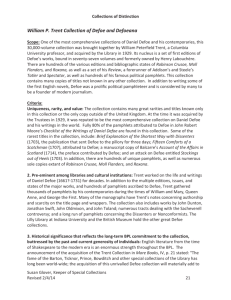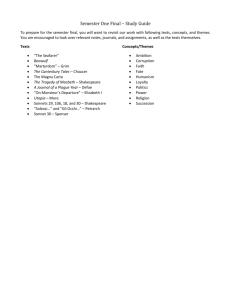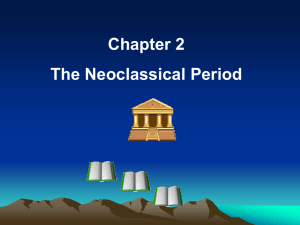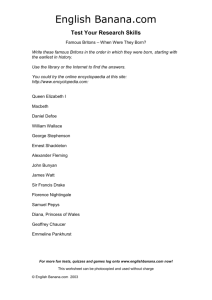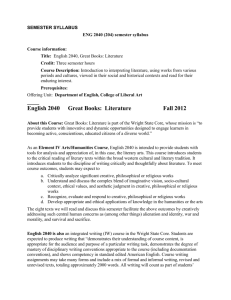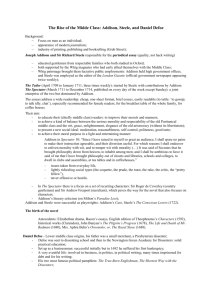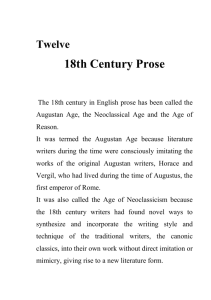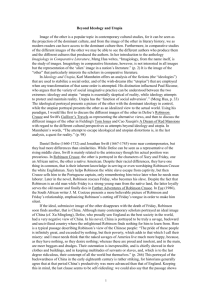An Essay Upon Future Defoe Projects Geoffrey Sill Rutgers
advertisement
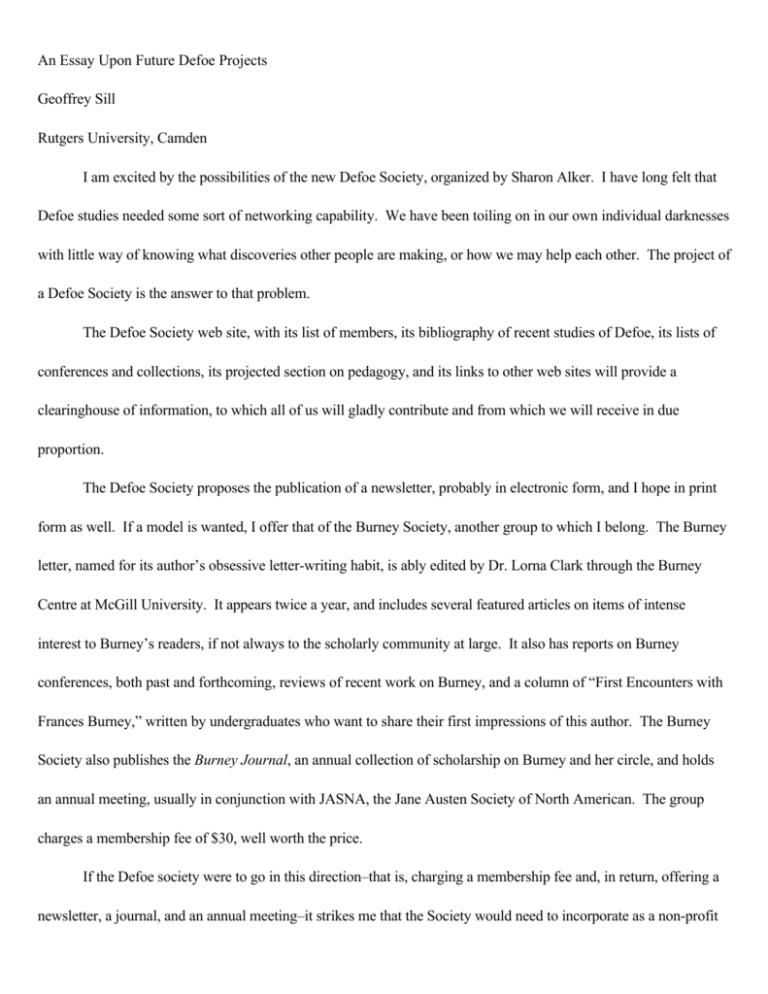
An Essay Upon Future Defoe Projects Geoffrey Sill Rutgers University, Camden I am excited by the possibilities of the new Defoe Society, organized by Sharon Alker. I have long felt that Defoe studies needed some sort of networking capability. We have been toiling on in our own individual darknesses with little way of knowing what discoveries other people are making, or how we may help each other. The project of a Defoe Society is the answer to that problem. The Defoe Society web site, with its list of members, its bibliography of recent studies of Defoe, its lists of conferences and collections, its projected section on pedagogy, and its links to other web sites will provide a clearinghouse of information, to which all of us will gladly contribute and from which we will receive in due proportion. The Defoe Society proposes the publication of a newsletter, probably in electronic form, and I hope in print form as well. If a model is wanted, I offer that of the Burney Society, another group to which I belong. The Burney letter, named for its author’s obsessive letter-writing habit, is ably edited by Dr. Lorna Clark through the Burney Centre at McGill University. It appears twice a year, and includes several featured articles on items of intense interest to Burney’s readers, if not always to the scholarly community at large. It also has reports on Burney conferences, both past and forthcoming, reviews of recent work on Burney, and a column of “First Encounters with Frances Burney,” written by undergraduates who want to share their first impressions of this author. The Burney Society also publishes the Burney Journal, an annual collection of scholarship on Burney and her circle, and holds an annual meeting, usually in conjunction with JASNA, the Jane Austen Society of North American. The group charges a membership fee of $30, well worth the price. If the Defoe society were to go in this direction–that is, charging a membership fee and, in return, offering a newsletter, a journal, and an annual meeting–it strikes me that the Society would need to incorporate as a non-profit organization, to adopt a set of by-laws, and elect a slate of officers. These things are not difficult to do, but they do require some willing volunteers. Perhaps that is one of the decisions that we could make this weekend. There are some other options for creative work in Defoe studies that may or may not involve working through a Defoe Society. One of them is the development of a full-text electronic edition of Defoe’s works. I initially discussed this idea with Jim Springer Borck in the 1980s, when we were talking about an electronic medium for testing the validity of the hundreds of titles that have been attributed to Defoe. Our plan at that time was to construct a database of portions of attributed works in order to be able to compare them to each other in terms of word use frequency and so forth. I asked why we should not construct a full-text database, instead of one consisting of extracts, and the answer at that time was that it would be too laborious and too expensive a project. I wonder if advances in the digitization of texts have now made such a project feasible. There are currently two editions of Defoe in progress, both very meritorious projects. But both are print editions, very expensive for libraries to purchase and ultimately not serviceable for text searching and comparison. Perhaps one or both of these projects could become the basis for a full-text electronic edition. A start has already been made in this direction by the annotatable online edition of Defoe’s Review, under the direction of Christopher Flynn and Natalie Roxburgh. This wonderful project makes Defoe’s Review available, one number at a time, in an interactive medium that allows readers to contribute, wikipedia-style, their own annotations to the text. Of course that open-access style creates problems of its own, for which the wikipedia is famous, but since the annotations are signed after a fashion, it might be a way of ultimately achieving, like The Talmud, a fully annotated edition of the canon of Defoe’s writings. Finally, the recent publications of a third and a fourth critical biography of Defoe have given new life to the question of his elusive nature. Just when we thought the definitive biographies by Paula Backscheider and Maximillian Novak had answered every conundrum about Defoe’s life, the Political Biography of Daniel Defoe by P. N. Furbank and W. R. Owens raises questions about his underlying Whiggism, and the Life of Daniel Defoe by John Richetti asks us to re-evaluate the critical significance of Defoe’s works. Richetti is even gently witty at the expense of his subject, remarking of one of Defoe’s pamphlets that the effect of reading it is “rather like Ravel’s ‘Bolero,’ intense, relentless, and at length annoying.” On the whole, his biography is an urbane, well-informed, and interesting account, not only of Defoe but of the entire Defoe enterprise. In closing, I would like to point to two projects upon which I think we should expend more time. One project is the effort to show that Defoe’s works lie at the beginning of a transatlantic mainstream that unites British and American literature. Robinson Crusoe is the great myth of the self, or as Ian Watt put it in his posthumous work, Myths of Modern Individualism, “a single-minded pursuit by the protagonist of one of the characteristic aspirations of Western man,” which is his own individual sovereignty (and, as Frances Burney said at the end of The Wanderer, of woman’s sovereignty as well). Watt looked backward from Robinson Crusoe, toward the origins of this myth in Don Quixote, Don Juan, and Faustus, but I look forward to Benjamin Franklin and Walt Whitman, whose pragmatical, egoistical selves are mere projections of that original indomitable adventurer. And second, we need to explore the entire subject of Defoe and slavery, a topic which both Britain and America seem finally willing to confront. We should neither condemn Defoe as an apologist for imperialism and colonialism, nor defend him despite the inadequacy of the reforms he projected, but rather try to understand the contradiction at the heart of Defoe’s thinking, and Western thought generally, that fostered the individualism of some at the expense of the liberty of an entire race of others. But I am afraid I will require another lifetime to understand this contradiction.
